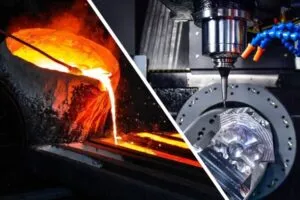Choosing the right steel for CNC machining is key to great results. Different steels have unique properties that affect how well they machine. Knowing which steel to use can make your work more precise and efficient.
Using the wrong steel can cause problems like poor accuracy or shorter tool life. It’s important to talk to trusted machining experts. They can help you pick the best steel for your project. This way, your parts will be better quality and last longer.
What Is Steel CNC Machining?
CNC machining, or Computer Numerical Control machining, changes how steel parts are made. It uses computers to control machines, making them move precisely. This leads to parts that are both accurate and detailed.
In a machining shop, CNC machines follow advanced programs to meet exact needs. Steel is a top choice for many industries because of its strength and versatility. CNC machining ensures that steel parts are made with high precision, meeting strict quality standards.
Using an online CNC service makes production easier. Businesses can upload designs and get quotes right away. This makes it simpler to access a wide range of machining options. As a result, manufacturers can create many CNC parts that meet tough demands.
Grades of Steel for CNC Machining
CNC machining metal uses different steel grades for various tasks. Each grade has special properties that affect project choices. Knowing these differences helps improve projects and manufacturing.
1018 Steel
1018 steel is great for machining and welding. It’s a low-carbon steel that’s strong and flexible. This makes it a top pick for parts like shafts and pins.
1215 Steel
1215 steel is known for easy machining. It’s perfect for making complex parts with tight tolerances. Its high-speed machining makes it efficient for detailed designs.
1045 Steel
1045 steel has more carbon, making it harder than others. It’s great for parts that need to last, like gears. CNC services often use it for tough projects.
AT-Machining
AT-Machining is a mix of materials for better CNC performance. It uses advanced techniques for top-notch quality and precision. This ensures CNC metal meets high standards.
The Benefits of Steel and its Challenges for CNC Machining
Steel is a top choice for CNC machining because of its many benefits. It has a high strength-to-weight ratio, making it ideal for many uses. Steel also doesn’t bend easily, which helps keep parts precise during machining.
Steel’s durability works well across different temperatures, making it versatile for various projects. This makes it a cost-effective option compared to other materials. Its ease of forming and cutting also boosts productivity and efficiency in machining services.
However, CNC machining with steel comes with its own set of challenges. Tool wear can be a problem due to steel’s hardness. This means tools need careful handling and specific cutting techniques.
Steel can also rust or corrode, especially in damp environments. Specialized machine settings are needed for harder steel types, adding complexity to machining. These factors need to be considered when working with steel in CNC machining.
Looking at both the benefits and challenges of steel in CNC machining gives a complete picture. It’s crucial for making smart decisions and improving machining processes.
The Top 10 Steels for CNC Machining Compared
Choosing the right CNC steel for machining projects is key. It’s important to know the properties of different steel grades. The table below compares the top steels for CNC machining. It looks at factors like machinability, tensile strength, cost, and suitable applications.
This comparison helps machining manufacturers and engineers make the best choices for their projects. It ensures that the selected steel meets the project’s needs.
| Steel Grade | Machinability | Tensile Strength (MPa) | Cost-Effectiveness | Applications |
|---|---|---|---|---|
| 1018 Steel | Excellent | 370 | Low | General machining, shafts |
| 1215 Steel | Very Good | 450 | Moderate | Screws, bolts |
| 1045 Steel | Good | 600 | Moderate | Standard parts, gears |
| 4140 Steel | Good | 800 | High | Heavy-duty applications |
| stainless 304 | Fair | 520 | High | Corrosion-resistant parts |
| stainless 316 | Fair | 580 | High | Chemical processing equipment |
| Alloy 6061 | Good | 310 | Moderate | Machined parts, marine applications |
| A36 Steel | Good | 400 | Low | Structural applications |
| O1 Tool Steel | Very Good | 800 | Moderate | Blanking, dies |
| D2 Tool Steel | Excellent | 1200 | High | High wear resistance applications |
Choosing the right CNC machining metal depends on knowing the strengths and weaknesses of different steels. This guide to the top 10 steels for CNC machining highlights their features. It’s a valuable resource for companies looking for reliable CNC machining services.
Is Steel the Right Choice for Your Project?
Choosing steel for your project needs careful thought. Think about how much weight or stress your project will handle. Steel is strong and durable, perfect for projects under a lot of stress.
Also, consider if your project needs precise parts. Steel is great for CNC machining because it’s strong and can handle tight tolerances. Check where your CNC parts will go. If they’ll face harsh conditions, steel might be a good choice.
Cost is another big factor. Steel is often a good mix of price and quality. But, compare it to other materials like aluminum or composites. Think about what you need, like how light the parts should be or if they need to resist corrosion.
Talking to a good machining shop can help. They can guide you on the best way to get what you need. This way, you can make a choice that works best for your project.
If steel isn’t right for you, look at other options. Each material has its own strengths and weaknesses. It’s key to match your project goals with the right material. This way, you can make sure your CNC machining project is a success.



















